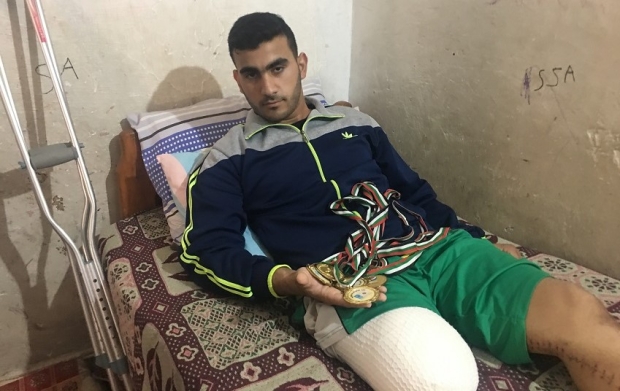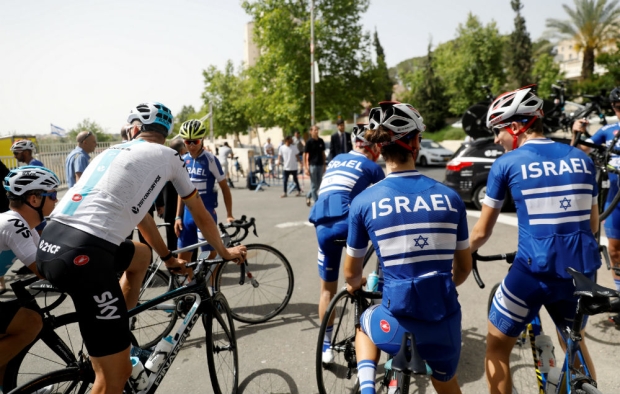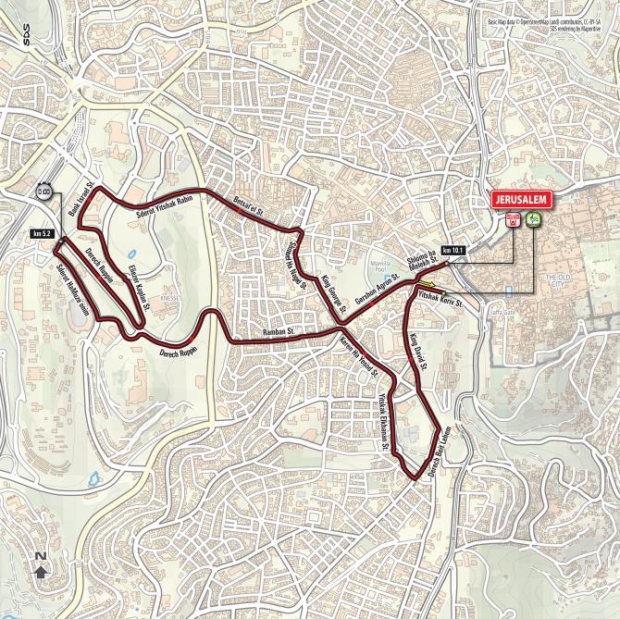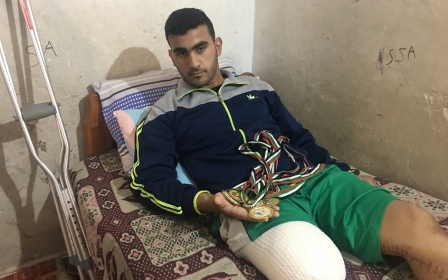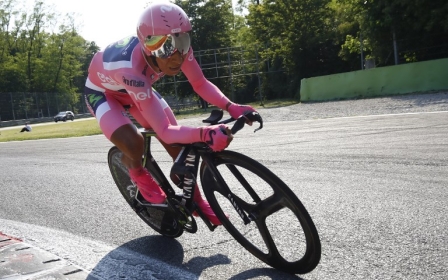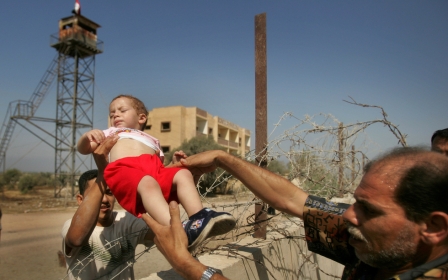Giro d'Italia: Palestinian cyclist shot in Gaza 'disgusted' at Israel staging race
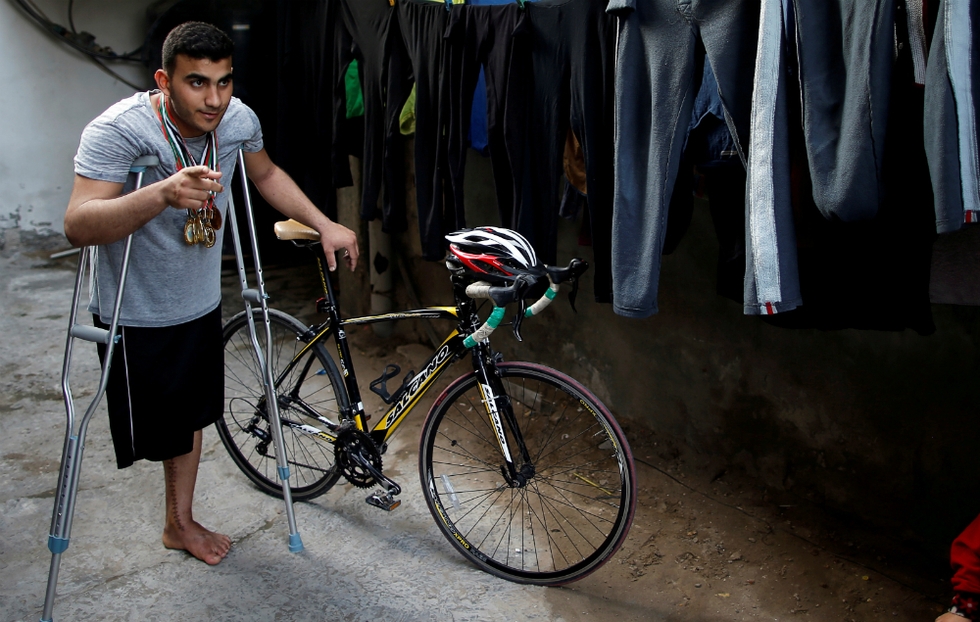
A Palestinian cyclist, who lost his right leg after being shot by an Israeli sniper while protesting near the Gaza border fence, has accused organisers and riders in the Giro d’Italia of encouraging Israeli violence by agreeing to race in the country.
Alaa al-Dali underwent eight operations and eventually had his right leg amputated after being shot while participating in “Great Return March” protests on 30 March.
The 21-year-old had been in contention to race for Palestine at the Asian Games in Jakarta in August and told Middle East Eye that the Israeli army had “destroyed his dream”.
The Giro d’Italia, one of cycling’s most prestigious races, begins in Jerusalem on Friday and Israel will host two further stages before the race returns to Italy, drawing condemnation from Palestinian rights activists and Boycott, Divestment and Sanctions (BDS) campaigners.
Al-Dali called on the international community to impose sanctions and a sporting boycott on Israel, rather than allowing it the "honour" of staging the race.
"It is very disappointing to know that people will be enjoying my favourite sport in the country whose army destroyed my dream," said al-Dali. "Not fair. I am shocked and disgusted by the news."
The race would only serve to highlight the gap between "the occupier and the occupied", he added.
"This is contradiction at its finest. Such events are supposed to represent peace and humanity. I cannot see anything peaceful in shooting and causing me disability for standing about 200 metres from the border fence."
But he said he believed there was a chance his leg could have been saved if he had not been denied permission by Israel to receive medical treatment in the West Bank.
The health care system in Gaza has been devastated by an 11-year blockade imposed by Israel after Hamas won elections, which has plunged the enclave into a humanitarian crisis.
'Blind eye to our suffering'
"The organisers and the participants are not only turning a blind eye to our suffering as athletes who are denied our basic rights, but are also encouraging the Israeli authorities to further impose restrictions and continue their abuses against us," Alaa al-Dali said.
According to Ashraf al-Qedra, spokesman for the Palestinian Ministry of Health in Gaza, at least 44 Palestinians have been killed and 7,000 others have been injured, including dozens who have been left with permanent disabilities, since the start of the Great Return March protests, in which Palestinians are demonstrating for their right to return to lands and homes seized by Israel in 1948 and subsequent conflicts.
Friday’s first stage of the Giro will see riders race around a 9.7km time trial course in west Jerusalem that ends under the walls of Jerusalem’s Old City in illegally occupied East Jerusalem.
Israel will then host stages between Haifa and Tel Aviv and from Beer Sheva across the Negev desert to the Red Sea port of Eilat.
The race features some of the world's top cyclists including Chris Froome, who is seeking to become the first rider in cycling's modern era to hold simultaneously all three of the sport's three grand tour titles, the Tour de France, the Vuelta d'Espana and the Giro d'Italia.
The staging of the race is especially sensitive because it coincides with celebrations marking the 70th anniversary of Israel’s independence day, and just days before Palestinians mark their own 70th anniversary of the Nakba, or Catastrophe, in which more than 750,000 people were forcibly displaced from their lands in May 1948.
An illustrated map of the race route published on the Giro's Twitter feed featured Jerusalem's Old City and the Dome of the Rock mosque.
The BDS movement has been campaigning for the race to be relocated since the route was announced last year, warning that staging the race in Israel would amount to a "stamp of approval" for "violations of international law and Palestinian human rights".
"Just as it would have been unacceptable for the Giro d’Italia to start from apartheid South Africa in the 1980s, it is unacceptable to start the race in Israel as it will only serve as a stamp of approval for Israel’s oppression of Palestinians," the movement stated on its official website.
Following the unveiling of the route for the race last November, rights groups issued a joint statement calling on the organisers RCS Sport to move the start from Israel, which according to the groups, will "exacerbate Israel’s sense of impunity".
In response, RCS Sport, the organiser of the Giro, said that the race was being held in Israel as part of the "internationalisation" of the event and as a "vehicle to export everything that is Italian to the world".
Race director Mauro Vegni said in September: "The reality is that we want it to be a sports event and stay away from any political discussion."
Saied Timraz, vice-president of the Palestinian Motorsport, Motorcycle and Bicycle Federation, said it was "unreasonable" to hold such a prestigious event in Israel at the same time as Palestinian athletes were being denied their basic rights by the Israeli authorities.
"Although sports and politics must be kept separate, there is nothing that can justify awarding the perpetrators."
According to Timraz, Israeli authorities denied him and six other Palestinian athletes Gaza-exit permits last November, to compete in the Arab Athletics Championships 2017, organised by the Arab Athletic Association in Tunisia.
"This is not the first time they deny us permits to compete in international events," said Timraz.
"The Israeli authorities intend to impose severe restrictions on Palestinians aiming to participate in events that would voice their suffering and show the true colours of the occupation."
This article is available in French on Middle East Eye French edition.
Middle East Eye propose une couverture et une analyse indépendantes et incomparables du Moyen-Orient, de l’Afrique du Nord et d’autres régions du monde. Pour en savoir plus sur la reprise de ce contenu et les frais qui s’appliquent, veuillez remplir ce formulaire [en anglais]. Pour en savoir plus sur MEE, cliquez ici [en anglais].


